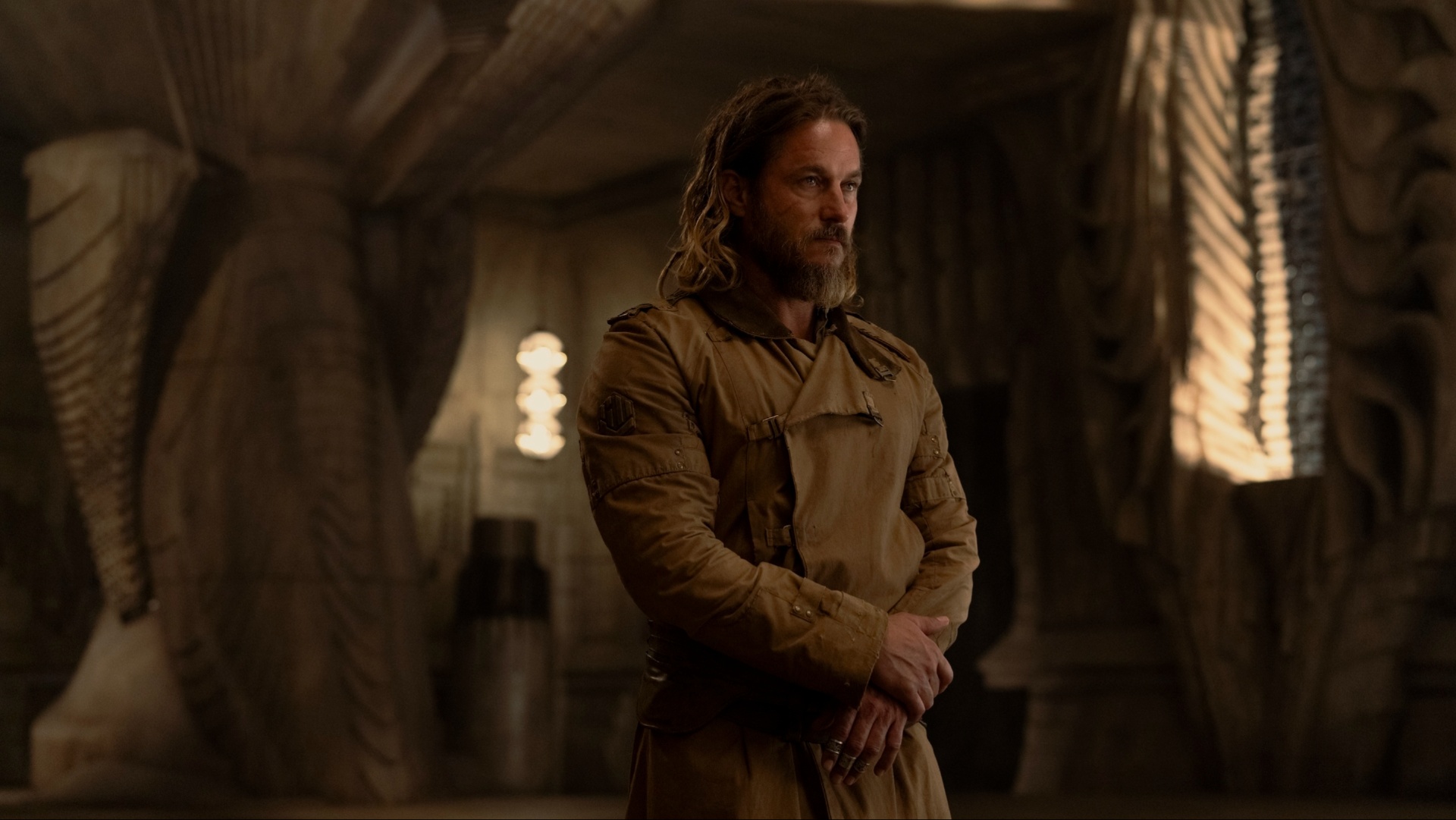
Warning: This article contains spoilers for Dune: Prophecy episodes 1 and 2.
Set 10,000 years before the era of Paul Atreides, Dune: Prophecy begins in the shadow of the Butlerian Jihad: a massive war between humans and "thinking machines," which led to the outlawing of AI.
In Dune: Prophecy’s prologue, this war looks a lot like Terminator’s dystopian future. A giant, crab-like robot attacks human soldiers with a laser cannon, while Valya Harkonnen's voiceover talks about humans rising up against "the thinking machines that had enslaved them." A couple of generations later, humans have built a new way of life, cementing a feudal government system with an emperor overseeing a web of aristocratic houses and organizations like the Bene Gesserit sisterhood.
For the show’s lead characters Valya and Tula Harkonnen, the primary concern is their feud with the Atreides family, who came out of the war looking heroic while the Harkonnens were branded as war criminals. But in a wider sense the fallout is more complicated, introducing a futuristic civilization that rejects computer technology. Instead of using machine intelligence, Dune's intergalactic empire prioritizes developing the human mind, whether that’s through mental training, genetic manipulation, or the consciousness-expanding drug known as spice.
Dune: Prophecy explores humanity's fear

In its first two episodes, Dune: Prophecy introduces an atmosphere of anti-AI paranoia. During the engagement party for Princess Ynez and Pruwet Richese in episode 1, the guests are horrified to learn that nine-year-old Pruwet is carrying around a robotic toy. He might as well have a nuke in his pocket, and the toy’s appearance is enough to cause a diplomatic scandal.
Ynez’s father, Emperor Javicco Corrino, reluctantly handwaves this incident so the betrothal can go ahead. However his loyal soldier Desmond Hart is less forgiving. The episode's final scene sees Hart assassinate Pruwet using a mysterious superpower, burning him alive from the inside out. Then in episode 2, Hart insinuates that this was a reasonable punishment for Pruwet violating the ban on thinking machines, describing Pruwet’s death as "justice."
Before Hart owned up to the murder, Empress Natalya was already willing to blame AI for Pruwet's death in a more literal sense. "You along with everyone else know the risks of thinking machines," she tells Pruwet’s grieving father. "They're unpredictable." Despite the lack of relevant evidence, she sees Pruwet’s rudimentary robot toy as a plausible explanation for an implausible death. This paints a picture of a society shaped by an extreme, borderline irrational fear of thinking machines, but that’s only half the story when it comes to Dune’s relationship with AI.
The Butlerian Jihad shaped Dune's universe

The Butlerian Jihad is an ancient piece of backstory for the main Dune saga. It provides a foundation for the books' blend of fantasy and sci-fi worldbuilding, depicting a universe where spirituality and mental enhancement have replaced computer technology.
Alongside the Spacing Guild (a monopolistic organization of interstellar traders), the Bene Gesserit rose to power after the war between humans and machines. Wielding massive political influence, they train their members to achieve extraordinary levels of mental and physical control, developing abilities like lie detection and the mind-controlling "Voice." Meanwhile, long-distance space travel came to rely on highly trained human calculators (Mentats), and enhanced humans (Guild Navigators) who gain prescient abilities by dosing themselves with spice.
So in Dune: Prophecy, we witness a culture where the human mind is paramount – not just in terms of strategic thinking, but in the way people try to upgrade the limits of human perception. This may include Desmond Hart’s ability to incinerate people with his mind, because he gained this power after being swallowed by a sandworm, the original source of spice.
While the Butlerian Jihad is portrayed onscreen as a war against killer robots, its original underpinnings are more philosophical – and very relevant to real-world concerns about machine learning. "Men turned their thinking over to machines in the hope that this would set them free," the Bene Gesserit Reverend Mother tells Paul Atreides in the first Dune book. "But that only permitted other men with machines to enslave them."
The crucial phrase here is "turned their thinking over to machines." This wasn’t just a Terminator-style war between humans and AI, it was an existential struggle over human consciousness. As the Reverend Mother explains, the anti-AI war removed humanity's "crutch," forcing people to hone their mental skills instead of relying on machines.
Dune: Prophecy hasn’t delved into this idea yet, but it has come up in promotional interviews for the show. Speaking to Variety, showrunner Alison Schapker mentioned the "great cost" humanity faced for outsourcing their thinking to AI in the Dune universe, tying this into the use of technology like ChatGPT today: "I walk around and I see people totally giving over their thinking. What happens if you don’t have a machine?"
So while Dune: Prophecy’s depiction of thinking machines is pretty basic (Pruwet Richese’s toy; the prologue's killer robots), the Imperium's rejection of AI actually goes much deeper, tapping into some of the oldest and most important foundations of Dune's world.
Dune: Prophecy is airing weekly, follow our Dune: Prophecy release schedule so you don't miss an episode.
For more, check out our Dune: Prophecy review or our guide to the other best shows on HBO Max to add to your watchlist.







